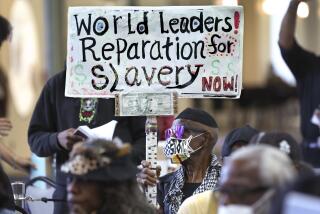Agreement Reached on Nazi Slave Reparations
- Share via
WASHINGTON — Ending months of sometimes acrimonious bargaining, U.S. and German negotiators have reached agreement on a $5.2-billion fund to compensate Nazi-era forced and slave laborers before they succumb to the ravages of advancing age, plaintiffs’ attorneys said Tuesday.
The plan, which remains tentative pending a final meeting in Berlin on Friday, comes closer to the $5.7 billion demanded by lawyers in a class-action lawsuit than to the $4.2 billion previously offered by the German government and companies that used forced labor during the war.
If finally approved and implemented, the settlement will end all legal claims against German companies and the Berlin government stemming from the use of forced and slave labor. The German firms demanded immunity from additional legal action in exchange for contributing to the fund.
Most German industrial companies used involuntary labor during World War II. The firms included Bayer pharmaceuticals, Volkswagen and Daimler-Benz. Plaintiffs said a number of non-German companies, such as Shell Oil, also used forced labor at their wartime German subsidiaries.
Michael Hausfeld, a Washington attorney and member of the plaintiffs’ legal team, said the proposed settlement “is not enough if you judge what should have been done, [but] it is clear that this is the best achievable result.”
He said Deputy Treasury Secretary Stuart E. Eizenstat, Washington’s chief negotiator, had told him Tuesday by telephone from Berlin, “Congratulations, the Germans have accepted your offer.”
Eizenstat’s office declined to comment before the meeting scheduled for Friday.
No one knows exactly how many of the estimated 12 million people forced to work in Germany’s war effort remain alive. Hausfeld cited “reliable information” that at least 1.7 million survive. All are elderly, and many are infirm.
“The Germans fell far short of the mark in terms of an expression of humanity or generosity,” said Melvyn Weiss, a New York attorney representing the victims. “Unfortunately, we have an aging clientele. We are getting a lot of pressure from the governments of Israel and the United States to provide the money quickly because of the circumstances. But it’s far from adequate.”
If the deal is approved Friday, Weiss said, the parties will then turn to the daunting task of determining how to split the money among eligible claimants.
Earlier, German industry pledged $2.6 billion, and the German government offered to contribute $1.6 billion. The breakthrough came when the government sweetened its offer by $1 billion.
Originally, the plaintiffs had demanded between $20 billion and $30 billion, but they scaled that demand down in the course of negotiations.
U.S. Jewish organizations hailed Tuesday’s agreement.
“While this important settlement represents closure on the legal and financial dimension of the use of slave and forced labor, it cannot represent the end of a public discussion of this issue,” said Abraham H. Foxman, national director of the Anti-Defamation League.
“The world must now turn its attention to the moral and historical lessons of the Holocaust era and learn from the actions of the banks, insurance companies and corporations who benefited financially from Nazi policies against Jews and others,” Foxman said.
Kenneth Bandler, a spokesman for the American Jewish Committee, said “the clock is ticking” because the victims are so old.
“This is very encouraging,” he said. “It looks like they have reached a settlement.”
Bandler noted that his organization last week named 255 corporations that allegedly employed forced labor and have never acknowledged responsibility. Seventeen of them agreed to participate in the compensation fund.
Under the agreement, the German parliament must pass legislation appropriating the government’s share of the settlement. There was no indication when the measure would be considered.
Many of the surviving laborers are non-Jews from Nazi-occupied countries in Central and Eastern Europe who were conscripted and sent to Germany to work in war industries. Although they were abused by their captors, they were not treated as harshly as concentration camp inmates.
Since the end of the war, Germany has paid about $60 billion to Holocaust victims. But this is the first time that compensation will go to forced and slave laborers.
More to Read
Sign up for Essential California
The most important California stories and recommendations in your inbox every morning.
You may occasionally receive promotional content from the Los Angeles Times.










